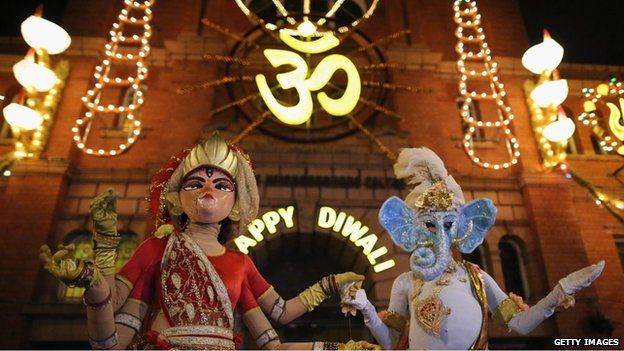UK should make Eid and Diwali public holidays, MP argues
- Published

The UK should show that it "embraces" the Muslim and Hindu faiths by making Eid and Diwali public holidays, Conservative MP Bob Blackman has said.
Mr Blackman is championing an e-petition demanding the change in Parliament, after it was signed by more than 120,000 people.
Muslims and Hindus should have "the most important days in their faiths recognised in law", the petition says.
The government has already rejected the e-petitioners' request.
In its response to the petition, the government said: "We are very aware of the importance of these festivals which are widely celebrated in the UK.
"Whilst we appreciate a new national holiday may benefit some communities and sectors, the cost to the economy remains considerable and any changes to the current arrangements would not take place without a full consultation."
'Bigger considerations'
Mr Blackman pressed ministers to reconsider during a debate in the House of Commons' secondary debating chamber of Westminster Hall.
He said the government's concern about cost was "valid".
The MP for Harrow East said: "According to the Centre for Economics and Business Research, each public holiday costs £2.3bn per day due to a loss of retail, commercial services, and other industries.
"So we're looking at an overall economic cost of just under £5bn if the Muslim faith and the Hindu faith were to be given one specified public holiday each, if the estimate is correct."
But, he continued, the think tank had also estimated that annual output would be raised by £19bn "if all public holidays were scrapped".
"That's not likely to happen. I can't believe any government would every dare to decide to cancel Christmas," Mr Blackman said.
"So we can't make a case for or against further public holidays just on the basis of money. If we did, we wouldn't have any public holidays at all."
There were "bigger considerations", he argued.
"Wouldn't it be a statement that we as a nation embrace these religions, and the people who hold them dear, and we are ready to recognise their place in our society?
"Creating these public holidays would be an important step towards promoting the understanding and tolerance of different faiths - not just at home, but abroad too.
"We want other nations to look to the UK for a good example of positive integration, and for highly skilled prospective immigrants to consider coming to our country with a sense that their faith is a respected part of their identity."
But Business Minister Jenny Willott was not persuaded by the MP's case.
"We are very lucky in this country to have such a hugely diverse and mixed and vibrant society that we all benefit from," she told MPs.
"Faith groups play a hugely important role in making life better for other people and making communities a better place for people to live."
But she emphasised ministers' concern about cost, and concluded: "The government does not believe that there should be a public holiday to mark these particular occasions.
"I know that will disappoint some people."
If an e-petition gets 10,000 signatures, it is eligible for a written response from the government, which is published alongside the original petition on the government's e-petitions website.
If it reaches as many as 100,000 signatures, a parliamentary committee will consider whether it merits a Commons debate if an MP wants to propose one.
- Published3 June 2014
- Published15 October 2013